Search Results for 'turtle farm'
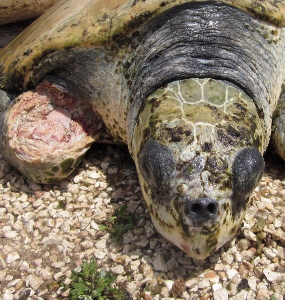
CTF evidence “watertight”
 (CNS): The global animal protection group calling for the Cayman Turtle Farm to alter its model and become a conservation facility rather than a farm is standing by its report, saying it is based on “watertight evidence”. Following a statement released by the Farm on Friday criticising the WSPA and denying the findings, the activists have said their claims are based on “photographic evidence and peer reviewed scientific analysis”, which revealed many welfare issues, including overcrowding, disease, cannibalism and unnecessary prolonged suffering. The WSPA said it has tried to work with the CTF and only in the face of its failure to act has it gone public with the damning report in the hope that it will move to address the concerns raised by the research.
(CNS): The global animal protection group calling for the Cayman Turtle Farm to alter its model and become a conservation facility rather than a farm is standing by its report, saying it is based on “watertight evidence”. Following a statement released by the Farm on Friday criticising the WSPA and denying the findings, the activists have said their claims are based on “photographic evidence and peer reviewed scientific analysis”, which revealed many welfare issues, including overcrowding, disease, cannibalism and unnecessary prolonged suffering. The WSPA said it has tried to work with the CTF and only in the face of its failure to act has it gone public with the damning report in the hope that it will move to address the concerns raised by the research.
“Our claims against the Cayman Turtle Farm (CTF) are founded on evidence gathered during a comprehensive, 18 month investigation into the treatment of the sea turtles at the CTF,” the World Society for the Protection of Animals said Monday in a statement released to the press. “This evidence is the basis for our compelling arguments against the CTF and is in the form of footage and photographic evidence and peer reviewed scientific analysis. WSPA does not initiate campaigns such as this without watertight evidence.”
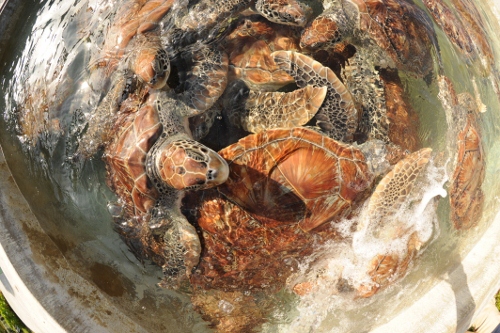 The activists explained that the investigation was carried out following a number of complaints made last year by scientific experts and visitors to the CTF, relating to the animal welfare conditions.
The activists explained that the investigation was carried out following a number of complaints made last year by scientific experts and visitors to the CTF, relating to the animal welfare conditions.
“To verify these concerns, we conducted our investigation in association with a number of research partners, and received two Freedom of Information (FOI) requests directly from the CTF,” a spokesperson for WSPA stated. “Our findings validated these concerns and have provided clear evidence of a range of different welfare related issues including but not restricted to: overcrowding, unsuitable captive conditions; disease; cannibalism; and unnecessary prolonged suffering.”
However, in the face of the damning report the CTF released a statement in which it denied the accusations claiming, despite the photographs to the contrary, that there was “no evidence of the kinds of injuries or defects among the turtles” shown in the report and the charity was on a “quest to shut down sea turtle farming.”
Although the organization has extensive footage of diseased and injured turtles, the Farm said that it had “succeeded in maintaining the health and well-being” of the turtles through veterinary treatment protocols and methods.
In its statement on Monday the WSPA added that the evidence generated by its broad investigation demonstrated that the Farm was not only a potential threat to wild turtle conservation efforts it was also a potential threat to human health as well.
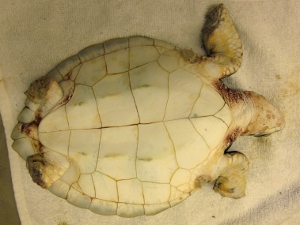 “Independent experts and leading scientists from institutions such as the University of Oxford, Murdoch University and the Emergent Disease Foundation have reviewed and endorsed our evidence. Furthermore, well established conservation bodies such as the Sea Turtle Conservancy, and Caribbean conservation organizations’ such as YWF-KIDO Foundation in Grenada (which is also part of WIDECAST) and FAADA (Spanish Foundation for the Protection of Animal), are also in support of our recommendations to the farm,” the WSPA added.
“Independent experts and leading scientists from institutions such as the University of Oxford, Murdoch University and the Emergent Disease Foundation have reviewed and endorsed our evidence. Furthermore, well established conservation bodies such as the Sea Turtle Conservancy, and Caribbean conservation organizations’ such as YWF-KIDO Foundation in Grenada (which is also part of WIDECAST) and FAADA (Spanish Foundation for the Protection of Animal), are also in support of our recommendations to the farm,” the WSPA added.
Acknowledging that the CTF has released some 31, 000 sea turtles since 1968, only 11 of the 200 sea turtles nesting on local beaches this year had Turtle Farm tags. The Farm also admitted in documents released under the FOI law that the number of animals released is falling, with an average of only 27 turtles per year over the last five years. The FOI request also showed that the extremely poor welfare conditions at the CTF are causing a high degree of sea turtle mortality. Over the last five years at least 300 green sea turtles have died on a yearly basis. This means that between 2007 and 2011 alone 2,299 green sea turtles have died at the farm outside of those slaughtered for meat.
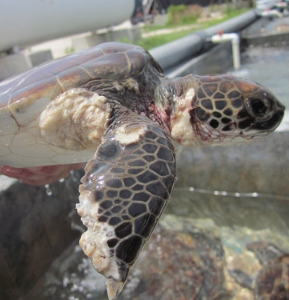 WSPA said it is not calling for the CTF to shut down all of its operations but to operate as a rehabilitation release, research and education facility that can still draw tourists. It recommends a shift away from commercial production for human consumption to conservation, but said the Farm should “immediately halt the inhumane public handling of turtles due to the animal welfare concerns associated with this activity.”
WSPA said it is not calling for the CTF to shut down all of its operations but to operate as a rehabilitation release, research and education facility that can still draw tourists. It recommends a shift away from commercial production for human consumption to conservation, but said the Farm should “immediately halt the inhumane public handling of turtles due to the animal welfare concerns associated with this activity.”
The charity said it first contacted the farm in May to express concerns. “We met with relevant CTF stakeholders in July 2012 to explore ways to collaborate; agreed a two month consideration period when it was made clear that the issue needed to be considered by senior politicians and subsequently provided a five week extension when the CTF failed to meet the agreed deadline,” it added.
Although the CTF claims to be taking the evidence seriously, as it has commission an independent review for December, the WSPA said that because of the repeated inaction despite its attempts to work with the farm aswell as the recent tragic incident loss of 300 more turtles after a tank failed during a leak repair, it had come to the conclusion that the Farm has little interest in working with it to find a solution to the animal welfare issues.
“This has left us with no option but to share our concerns with the general public, which we hope will encourage the CTF to address our concerns,” the charity stated.
It is clear that the organisation intends to push ahead with the campaign. Since going public with the report last week and creating a website at the weekend, which includes the visual and scientific evidence it uncovered during its research at CTF, some 8,800 people have signed up to join the campaign. Although the Farm has faced international criticisms in the past, this is the first time it has faced a campaign of such magnitude backed by scientific and visual evidence and spearheaded by a well-known and well respected global organisation.
See full statement from WSPA below and more details at www.stopseaturtlefarm.org
Related article on CNS story along with government statements.
Photos supplied by WSPA.
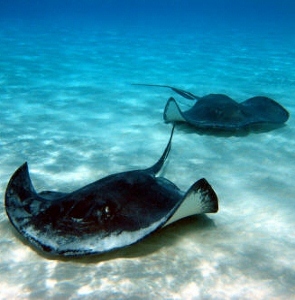
Stingray rescue sees captives returned to wild
 (CNS): Stingrays that normally spend their time at the Sandbar and Stingray City were returned to the wild on Monday after Department of Environment officials rescued them from captivity at a local dolphinarium. DoE officials told CNS on Monday that they were able to successfully transfer four tagged stingrays from Dolphin Discovery to the Sandbar after the owners agreed to give up the creatures, which were identified as ones associated with the wildlife interaction zone (WIZ), after a local vet spotted the tags while visiting the facility. However, six other un-tagged rays still remain in captivity at the facility.
(CNS): Stingrays that normally spend their time at the Sandbar and Stingray City were returned to the wild on Monday after Department of Environment officials rescued them from captivity at a local dolphinarium. DoE officials told CNS on Monday that they were able to successfully transfer four tagged stingrays from Dolphin Discovery to the Sandbar after the owners agreed to give up the creatures, which were identified as ones associated with the wildlife interaction zone (WIZ), after a local vet spotted the tags while visiting the facility. However, six other un-tagged rays still remain in captivity at the facility.
On Friday DoE Director Gina Ebanks-Petrie said that the dolphin facility had also been asked to release the six rays that were not tagged but werelikely to be from the local population that frequents the Sandbar. However, the owners had not responded to that request and appeared reluctant to let these creatures go, she said.
It is understood that while less than half a dozen male rays were counted at the Sandbar during the most recent survey of the dwindling numbers, five of the six stingrays which the West Bay dolphinarium is continuing to hold captive are male.
The revelations that the Stingrays were being held at the tourist attraction highlighted the plight of these creatures as they have no protection in law. Although the Stingrays are supposed to be protected while they are inside the wildlife interaction zone around the Sandbar and Stingray City, if the rays swim outside that zone, as they frequently do, they have absolutely no protection.
Although there has been considerable public outrage about the stingrays being kept at the dolphinarium, because there is no evidence that the four tagged rays were taken from the WIZ there is nothing to prevent the facility from keeping the six untagged rays.
Dolphin Discovery, as well as many other animal related businesses in Cayman, including the Turtle Farm, does not have a license to hold animals because the Department of Agriculture, inexplicably, is not enforcing the law, there is no possible sanction against the facility.
If the Animals Law was being enforced and the dolphinarium did have a license to hold these marine mammals, the acquisition of Stingrays would have required the facility to apply for a change of use license and the issue may have come to light sooner and created an opportunity for officials to refuse such a change and see all ten creatures released.
The recent situation has highlighted, once again, the inadequacy of current legislation and the failure of other government departments to protect wildlife in the Cayman Islands, despite the efforts of the DoE and the significance of Stingray City and the Sandbar to the wider tourism product.
Related article:

Government boards and committees
Government boards are set to over oversee various government entities. They are appointed by the current administration.
Adoption Board
Advisory Committee on the Prerogative of Mercy
Agricultural Development Committee
Airports Authority Board
Air Transport Licensing Authority
Animal Welfare Advisory Committee
Anti-Money Laundering Steering Group
Aquaculture Development Committee
Assessment Committee (Roads)
Beautification Committees
Business Staffing Plan Board
CAYS Foundation Board of Directors
CINICO Ltd Board of Directors
Caribbean Examinations Council National Committee
Cayman Against Substance Abuse
Cayman Airways Board Of Directors
Cayman Islands Development Bank Board
Cayman Islands Film Commission
Cayman Islands Monetary Authority Board of Directors
Cayman National Cultural Foundation Board
Cayman Turtle Farm Ltd. Board of Directors
Caymanian Status & Permanent Residency Board
Central Planning Authority
Central Tenders Committee
Civic Centre Management Committee, Aston Rutty Centre, Cayman Brac
Cinematographic Authority
Civil Aviation Authority Board (345) 949-7811
Commonwealth Parliamentary Association (CPA) of the Legislative Assembly
Commonwealth Parliamentary Association (CPA) Executive Committee of the Legislative Assembly
Community Development Action Committees (CODACS)
Company Sector Consultative Committee
Council for Professions Allied with Medicine
Dangerous Substance Handling & Storage Board
Department of Vehicle & Equipment Services Board
Development Control Board
Development Plan Tribunal
E-Business Advisory Board
Education & Training Board
Education Appeals Tribunal
Education Board Cayman Brac & Little Cayman
Education Council
Electrical Board of Examiners
Electricity Regulatory Authority Board
Financial Reporting Authority
Financial Services Committee
Grand Court Rules Committee
Growth Management / Investment Advisory Board
Health Appeals Tribunal
Health Councils
Health Services Authority Board Of Directors
Hospital Complaints Committee
Hotels Licensing Board
Immigration Appeals Tribunal
Immigration Board Cayman Brac & Little Cayman
Information & Communications Technology Authority Board
Investors in People Steering Committee
Labour Appeals Tribunal
Labour Tribunals
Labour Tribunal of Cayman Brac & Little Cayman
Land Surveyors Board
Legal Advisory Council
Legislative Assembly Committees
Library Committee of Management
Liquor Licensing Board (Grand Cayman)
Liquor Licensing Board of Cayman Brac & Little Cayman
Marine Conservation Board
Maritime (Shipping) Sector Consultative Committee
Maritime Authority of the Cayman Islands Board of Directors
Medical & Dental Council
Miss Cayman Islands Committee
Museum Board of Control
Museum Law – Trustees
National Council of Voluntary Organisations
National Drug Council
National Gallery
National Gallery & Art Institute Board
National Gallery Management Board
National Gallery Trustees
National Housing Development Trust Board of Directors
National Hurricane Committee
National Pensions Board
National Roads Authority Board
National Trust Council (Appointment of Certain Members)
National Security Council
National Youth Commission
Nursing & Midwifery Council
Parole Commissioners Board
Pedro St. James National Historic Site
Pharmacy Council
Pirates Week Festival Committee
Planning Appeals Tribunal
Planning Appeals Tribunal (Sister Islands)
Plumbers Examination Board
Port Authority Board (345) 949-2228
Price Gouging Control Commission
Prison Inspection Board
Private Finance Initiative Advisory Board
Private Sector Consultative Committee
Public Library Management Committee
Public Sector Investment Committee
Public Service Pensions Board
Public Service Pensions Board Trustees
Public Transport Board
Receiver of Wrecks for the Cayman Islands
Shipping Sector Consultative Committee
Sister Islands Affordable Housing Development Corporation Board
Special Land Disputes Tribunal
Stamp Advisory Committee
Stamps Survey Board
Street Naming & Property Numbering Committee
T E McField Youth & Community Centre Management Committee
Tertiary Education Council
Tourism Advisory Council
Tourism Attraction Board
Trade & Business Licensing Board
University College Board of Governors
Utilities Advisory Committee
Veterinary Board
Water Authority Board
Work Permit Board

Statutory authorities & Government-owned business
Statutory authorities and government companies are owned by the government on behalf of the people of the Cayman Islands but are legally separate from the government. The ownership relationship exists regardless of whether it is reflected in the form of shares or a formal capital holding.
Statutory authorities:
Cayman Islands Airports Authority (CIAA)
Cayman Islands Monetary Authority (CIMA)
Civil Aviation Authority (CAA)
Electricity Regulatory Authority (ERA)
Health Services Authority (HSA)
Information Communications and Technology Authority (ICTA)
Maritime Authority of the Cayman Islands (MACI)
National Roads Authority (NRA)
Port Authority of the Cayman Islands
Stock Exchange Authority
Tax Information Authority (TIA)
Water Authority (WA)
Government-owned companies:
Cayman Airways Ltd (CAL)
Cayman Islands Development Bank (CIDB)
Cayman Islands National Insurance Company Limited (CINICO)
Cayman Islands National Museum
Cayman Islands National Cultural Foundation
Children and Youth Services (CAYS) Foundation
Cayman Islands Stock Exchange Limited (CSX)
Cayman Turtle Farm (1983) Limited
National Drug Council
National Gallery of the Cayman Islands
National Housing Development Trust
Public Service Pensions Board
Sister Islands Affordable Housing Corporation (SIAHC)
Tourism Attractions Board
University College of the Cayman Islands (UCCI)

Historic spending revealed
 (CNS): Despite the premier’s claims thathis government has made significant cuts to public spending, the Annual Plan and Estimates reveal that government intends to spend close to three quarters of a billion dollars over this financial year. When government’s core operating expenses are added together with spending on government companies and statutory authorities, it will spend a record $713 million, according to the now published budget documents. However, as a result of the UK’s refusal to allow more public borrowing and in order to achieve a significant surplus, government is forecasting the collection of a staggering $834 million in fees and taxes via the entire public sector.
(CNS): Despite the premier’s claims thathis government has made significant cuts to public spending, the Annual Plan and Estimates reveal that government intends to spend close to three quarters of a billion dollars over this financial year. When government’s core operating expenses are added together with spending on government companies and statutory authorities, it will spend a record $713 million, according to the now published budget documents. However, as a result of the UK’s refusal to allow more public borrowing and in order to achieve a significant surplus, government is forecasting the collection of a staggering $834 million in fees and taxes via the entire public sector.
The government is projecting a surplus of some $82 million when the operating expenses and anticipated revenues of the entire public sector are taken into account.
As the legislative process on the budget continued Thursday, there was still no word from the UK that the budget currently under debate would be approved. However, government has now published the relevant documents that contain the spending and revenue earning statistics on which it has based its spending plans for the final year of this administration.
The budget documents reveal that there are few major cuts in public spending and many line items have been increased, with expenditure in some areas outstripping that of the last financial year.
Cuts in the fire service, road maintenance, services at district health clinics and spending on tourism marketing have been outweighed by some significant increases in other areas. The Turtle Farm subsidy has increased by $1 million on last year’s forecast and the premier’s National Building Fund has also been boosted by more than $1.5 million over last year’s allocation, standing at over $4.5 million compared to the $3 million allocated to it in 2011/12.
According to government’s revenue projects, core government expects to collect some $105 milllion more than it collected during the 2011/12 financial year.
Based for the first time on a projection of 75% compliance, as opposed to the 100% projection in the past, government is forecasting the collection of an extra $10 million this year from bank licences, an extra $9 million from work permit fees and a further $12 million in duty. It is also hoping to raise close to $20 million from new fees relating to directors of offshore companies. A new departure tax is expected to generate a further $3 million and an increase in tourism accommodation fees is a forecast to bring in an extra $3 million.
Legislators will begin examining the budget in more detail during Finance Committee, which was expected to begin Thursday evening.

Big pay outs despite cuts
 (CNS): The premier is likely to face further criticisms in the coming weeks not just from the opposition benches but across the community as the details of the operational expenses in the Appropriation’s Bill are explored, including $10.5 million to the Turtle Farm, $1.5 million for the hurricane shelter on Cayman Brac and some $4.5 million to the premier’s Nation Building Fund. Although there is still no word from the UK regarding the budget tabled in the Legislative Assembly on Monday, the debate on the Throne Speech and Appropriations Bill will begin this afternoon at 4pm with the leader of the opposition’s reply to government, which will be followed later in the week by Finance Committee.
(CNS): The premier is likely to face further criticisms in the coming weeks not just from the opposition benches but across the community as the details of the operational expenses in the Appropriation’s Bill are explored, including $10.5 million to the Turtle Farm, $1.5 million for the hurricane shelter on Cayman Brac and some $4.5 million to the premier’s Nation Building Fund. Although there is still no word from the UK regarding the budget tabled in the Legislative Assembly on Monday, the debate on the Throne Speech and Appropriations Bill will begin this afternoon at 4pm with the leader of the opposition’s reply to government, which will be followed later in the week by Finance Committee.
At that point members of the legislature are meant to quiz ministers and their senior staff on operational expenses to ensure the public is receiving value for money. But with the clock ticking on the need for the bill to be passed into law by Friday 31 August, McKeeva Bush in his role as chairman of the Finance Committee is likely to ensure questions are cut short.
There are a number of payments in the bill, however, that are likely to raise the alarm, given the current climate of austerity, which government will be required to justify, not least because of the crisis that has ensued over the last few months with the UDP government’s final budget.
The documents detailing the annual plan and estimates, purchase and ownership agreements are not yet available to the public because of the failure of government to meet the FCO economic advisor’s framework for this year’s budget until the eleventh hour.
This government is aiming to collect the most revenue of any administration in the history of the Cayman Islands since they are not able to borrow to cover any government expenditure and the UK has requested a substantial surplusat the end of this current financial year. But the UDP administration is spending a considerable amount, with core operational expenses at $531 million, which is still higher than previous years.
The budget debate could last several days before the legislators begin their detailed examination of government spending in Finance Committee as each member of the LA is allowed to speak for as long as two hours. The debate will end when Bush gives his reply to the MLAs' contributions. Speaking on Monday evening, the premier warned members that the House would sit late until the job was done.
At this stage, however, although government has set the legislative process in motion it is still waiting on the UK’s approval of the budget, which was presented to the FCO this week. The final and critical step in making this financial spending plan law is the governor’s assent to the bill – something that won’t be forthcoming without agreement from the FCO.
See Appropriations Bill below.

Solutions vs politics
I write to discuss the acute political, financial and reputational issues facing our country and the need for our collective behavior and decisions to reflect the seriousness of the situation. The focus must be on solutions. I will deal first with the political issues. When I resigned as a member of the PPM in 2010 I said that we had made a mistake in embracing the Caribbean model of party politics and encouraged other party members, from both parties, to admit our collective mistake and to change course.
It is important for us to recognize and acknowledge when our country started on this pronounced downward trajectory. It was in 2001. It is no coincidence that 2001 was also the year that we embraced and introduced party politics in Cayman.
Since 2001 both parties have been focused on remaining in power and winning the next election. Prior to 2001, when there were no political parties, governments were traditionally given two terms to implement their agenda. Since party politics came into being good governance and effective policy making have taken a nosedive and voter frustration has grown exponentially, which has resulted in each government being given one term only. Our society has become more divided and the unity between Caymanians and expatriates, which was hitherto the cornerstone of our success as a country, has all but disappeared. There is widespread political victimization as well as politicization of our civil service. Our continued denial of these glaring realities is the reason why the downward trajectory continues.
The solution to our political problems must therefore be to vote in the 2013 general elections to elect a coalition government consisting of a good mixture of candidates and begin the process of disbanding political parties. This will force the 18 MLAs, irrespective of their political views, to work together to form a government. You would still have the all important check and balance of an opposition to government when members, unrestrained by party rules, feel the need to oppose government policy.
I now turn to the current budget crisis. We all know how we got here and both the PPM and the UDP must share in the responsibility. As citizens we must also acknowledge some responsibility as our demands on government for services and favours are very hard for the party in power to resist. It is important that we all acknowledge that nothing is for free and every service and favour provided by government must ultimately be paid for by all of us. Government does not automatically generate money by its mere existence. So nothing is free and we must all pay, one way or the other, directly or indirectly, for government to operate.
Tinkering with our revenue and expenditure, such as was last proposed by government, will do nothing to balance our budget in the medium term. If we continue this band aid approach the UK will never approve our budget and could ultimately assume absolute control of our finances by suspending section 54(1) of our 2009 Constitution which mandates that a Minister “shallbe charged with responsibility for finance.”
The government must focus on expenditure and implement a medium term plan to bring it in line with what is considered sustainable for a country with our tax regime and GDP.
Let us look at some significant spending that could be eliminated from our budget during the next two financial years. It is important to note that I do not have access to the government’s draft budget so I can only make recommendations about what I have personal knowledge of.
The size of the civil service must be reduced but that can only be done over time and on a phased basis through collaboration with the private sector but planning and execution must commence now. It would be wrong, for many reasons, to convert a large number of civil servants to ‘unemployed status’. This would result in unnecessary hardships on our families and cause a further downturn in our economy as those salaries are removed from circulation locally. At the same time it would increase government’s expenditure as more and more people seek government assistance to survive.
Therefore, an integral part of the programme must be to transition some civil servants to the private sector so as to ensure that their income is protected while simultaneously reducing government’s expenditure and providing labour for the private sector. The aim should be to reduce government’s expenditure on salaries by $10M annually over 5 years, which would represent a total reduction of $50M in expenditure. On the basis of an average annual salary of $39,000, this equates to the migration of approximately 256 civil servants to the private sector annually over a 5 year period for a total reduction of 1,280 civil servants. With an average of 19,000 work permits in existence annually, this is easily achievable.
The following additional actions could be taken to reduce expenditure :
- Cayman Turtle Farm Island Wildlife Encounter – Close all components of this attraction except the Turtle Farm related operations. This would allow for the subsidy to be reduced from $9M to $1M, an annual savings of CI$8M;
- Tourism Attractions Board – Privatize its operations, including Pedro Castle, the Botanic Park, Hell and the Craft Market and save approximately CI$1.4M in annual subsidy;
- Cayman Airways – The Panama and Dallas routes should not have been launched in the middle of a budget crisis and a global recession. Immediately discontinue these routes and eliminate the approximately $1.5M marketing and operational budget associated with them. Reinstate the implementation plan for the Lufthansa Consultants Report which was commenced in 2008 and this will save the airline approximately $2M annually. This should convert into a $2M reduction in government’s annual subsidy to Cayman Airways;
- The Nation Building Fund – This has been justified on the basis that our children need money for scholarships and our churches need money for ‘nation building’. Yet we have properly functioning Education Council and Ministry of Tourism Scholarship programmes with properly established criterion awarding record numbers of scholarships annually. Our churches have an obligation to act as a moral compass for our society rather than inadvertently promoting greed through accepting government’s patronage. Any money given to churches for infrastructure projects, such as hurricane shelter space, is easily justified but must be properly funded through government’s capital development programme and not through this illusive creature called a “Nation Building Fund”. Eliminate it and save $4M annually;
- Government Administration Building – Mandate all remaining government agencies that were slated to move into the new Government Administration Building to do so withoutfurther delay. This could save the government approximately $2.5M in lease costs annually; and
- Health Services Authority – Implement and enforce more prudent policies and eliminate the significant waste by mandating the HSA to deliver its services within the $8M annual subsidy. This would save on average $12M annually by eliminating the need to provide large allocations of supplementary funding. Health care subsidies to the HSA have continued to increase to unsustainable levels growing from a total of $17M in 2009/10 to $19M in 2010/11 to $27M in 2011/12.
On the revenue side, if sufficient resources were made available to the right agencies the proposed revenue measures for this year would be unnecessary.
I am advised that if sufficient resources were deployed to enforce the Proceeds of Crime Law, $60M – $70M could be deposited into the government's treasury in this financial year alone. Why is this being ignored ?
My recommendations, if pursued, could potentially save the government $41.4M annually and much more over time. Revenue in this 2012/13 financial year could improve by $60M – $70M.
Finally we must look at what must be done about the significant reputational damage that has been caused to our country in recent times when good governance issues have arisen and when announcements about direct taxation sent shockwaves throughout our local economy. This presented yet another platform for negative international media coverage about the Cayman Islands.
Much damage has already been done to our economy but there is no point is crying over spilled milk. Let’s clean it up! There is an urgent need for the private and public sectors to collaborate and to launch a robust and cogent international public relations damage control campaign.
Premier McKeeva Bush’s insistence on remaining in office pending the outcome of the three police investigations must be addressed decisively. It is obvious that both political parties are impotent in addressing the issues. We should not expect our situation to improve absent leaders who do not have the courage to tell our country the truth and to do what needs to be done to fix our problems.
It is wrong to try to rush police investigations for reasons which are well known to law enforcement professionals. The only alternative, therefore, is for the business sector to call for the premier’s removal from office. The business sector is in a position to facilitate this and to prevent further reputational damage to our country. I call upon them to do so as a matter of urgency.
I sincerely hope that my recommended solutions will be objectively considered and that anyone who may feel personally offended by anything I’ve said will understand that this is bigger than any one of us. This is first and foremost about Cayman.
Charles Clifford is a former minister of tourism, environment, investment & commerce.

Other options to tax
There is no need for any form of direct taxation, or any VAT or any other such measure either now or in the foreseeable future. What we as voters require, and what the UK also requires, is sustainable government spending. The most sustainable government financial system is one that limits expenditures. What is required is for government to eliminate waste, corruption and patronage. That may be hard for any politician whose core political constituency is based on these elements.
Mr Miller made some very good suggestions Friday evening regarding both additional revenue sources and areas for possible expenditure cuts. He is to be commended. Perhaps some of our other highly paid politicians might now make equally clear suggestions for getting our finances out of the current mess, rather than just waiting their turn to board the gravy train.
Here are some areas of expenditure that I suggest can be cut. These are derived from the Government’s own June 2012 interim budget. I have merely annualized the expenses they published. See here
The government is currently subsidizing Cayman Airways to the amount of almost $2,000,000 per month. (See budget items CAL 1, CAL 2, and EI 1.) Over the years some $300,000,000 has gone this way, a large part of the total debt of the Cayman Islands. As part of this subsidy the government has been subsidizing essentially free travel for a vast number of Cayman Airways staff and their families and former staff and their families and dozens, if not hundreds, of current and former political appointees and their families, over many years. That needs to end. The entire subsidy to Cayman Airways needs to end. As an older Caymanian I understand the emotional attachment to Cayman Airways, but cutting the subsidy to Cayman Airways would eliminate half of the government’s projected deficit. It has to happen.
The government is also subsidizing the Turtle Farm to the extent of approximately $1,000,000 per month. This is what is shown by budget item EI49. That subsidy has been going on for years at a total cost of many tens of millions. I understand the emotional appeal of the Turtle Farm for Caymanians, but eliminating that annual subsidy would eliminate almost one quarter of the government’s projected deficit. It has to happen.
The premier proposes to keep the various “nation building” and other questionable funds that he controls to the tune of some $5,000,000 per year. (See budget item TP 52.) If that was eliminated another 10% of the government’s deficit would disappear.
The government also spends/wastes something like three quarters of a million dollars per year on what it calls “protocol services”. Perhaps that is where they put the bills for the personal servants, fencing, gas guzzling vehicles, personal Christmas lights, home electricity bills, etc., that are claimed (without any Constitutional basis) as “perks of the job”. See Budget Item CBO 9.
Credit card bills for luxury travel as well as “consultants” pay are buried in vague one line budget items. Double dipping by politicians, which costs the country an estimated a half million per year, is buried. The ministries controlled by the premier have a budget item (OE86) of something like $45,000 per month spent on “Compensation”, presumably to an entity outside government, with no indication of any benefit that the country receives for such an expense.
It is too easy for our politicians to say, “We really enjoy spending more and more of your money without any accountability and we don’t care how much it is going to cost you for us to get that money.” Perhaps that statement is too harsh. Perhaps it is more correct to say that the government has not even a glimmer of an understanding of what it will cost to implement new revenue measures of the type they have presented.
Introducing any new forms of taxation, whether in the form of an income tax such as the proposed payroll tax or in the form of a VAT, will require government to greatly expand the civil service rather than shrink it. The proposed new taxes will also require government to put in place very expensive systems for collection and enforcement. Either of these tax systems will cost many millions for government and the private sector to implement. That will negate most if not all of any additional revenue and it will lead government to raise the rates of such taxes time and time again.
Sustainable government finances require prudent spending above all else. All the revenue in the world is not sufficient for a wasteful government. Forcing expats (and in a few months Caymanians as well) to subsidize government waste is not the answer. Every person and every organisation in the Cayman Islands should insist that every possible expenditure is cut to the bare minimum BEFORE we even think of raising taxes. If at the end of the day more money is required for government, then existing collection systems should be utilised to minimise the cost of obtaining revenue.
I would encourage everyone and every organisation to make yourself very clearly heard on this issue. If you do not, you will have only yourself to blame as you watch our country implode.

Time to stop name calling
As many people know, both my wife and I keep up with the news from Cayman. It was with considerable dismay that I read the story where Mr Bush called the current Auditor General a “hitman”. People with a long memory will remember him accusing me of the same thing.
As far as I can tell, Mr Swarbrick is doing a good job in a difficult position. He understands his job and is doing it to the best of his ability. Without a strong Auditor General, I fear that there would be no real accountability within government. For the premier to attack this Office and the current Auditor General is just politicking at its most base level. I hope that all Caymanians will join me in supporting the Auditor General’s Office and the current AG as he continues to fight for value for money and accountability.
I remember well when I was similarly attacked by Mr Bush with similar comments. At the time, I felt I couldn’t respond and I am sure that the present AG feels the same way. But as a private citizen now, I can say some things that need to be said.
Mr Swarbrick and his Office are not hitmen. Yes, they say things that are difficult on the government of the day but it is not personal. I am sure that people will remember that the Office was often critical of government when the present opposition was in power. In fact, they didn’t always like our reports then either. The simple truth is the Office of the Auditor General is not political but it does report when it finds areas of poor value for money or poor accountability.
The solution for politicians is quite simple. Stop allowing money to be spent without due regard for value for money (such as the Cohen financing and Turtle Farm) and stop allowing money to be wasted (Gasboy et al). I am sure that the AG will be happy to report good behaviour as well as bad. However, if you continue with such behaviour, I hope for the sake of the Cayman Islands that the AG will continue to report it.
One final point. The Premier stated that he plans to sue the AG. I can’t imagine what basis he would feels a lawsuit is warranted. As far as this poor accountant can tell, doing his job well is NOT the basis for a lawsuit! Rest assured that if Mr Bush wants to continue down such a treacherous path, I would be happy to come downto testify (at my own expense) for the current AG and his Office.
As always, I wish the people of the Cayman Islands prosperity and well wishes.
Dan Duguay was the auditor general of the Cayman Islands from February 2004 to May 2010.

No interim revenue revealed
 (CNS): As legislators debated late on Wednesday evening, no details of how government intended to fund its request for $127 million were revealed. Although the premier has statedthat he needs to cut government’s core operational expenses to well below last year’s figure, there are no cuts in spending for the interim plan, which averages expense of almost $63.5 million per month. Bush did not say what government’s projected earnings would be for the next two months but has requested an overdraft facility of $25 million. If government was to continue spending at the same rate for the rest of the year it would need to cover expenses of around $760 million.
(CNS): As legislators debated late on Wednesday evening, no details of how government intended to fund its request for $127 million were revealed. Although the premier has statedthat he needs to cut government’s core operational expenses to well below last year’s figure, there are no cuts in spending for the interim plan, which averages expense of almost $63.5 million per month. Bush did not say what government’s projected earnings would be for the next two months but has requested an overdraft facility of $25 million. If government was to continue spending at the same rate for the rest of the year it would need to cover expenses of around $760 million.
Although McKeeva Bush said the two month spending plan should not be translated as “2/12ths” of the amount that government will spend over the next fiscal year, he did not say how the expenses would be paid for or how he would then hone down the next ten months to an average monthly spending of less than $40 million to reach a balanced budget for the rest of the year.
Bush said the FCO is insisting on further reductions to the premier’s original spending target of $498 million. This means he will need to reduce operating expenses for government over the remaining ten months to an average of less than $37 million — a task which seems almost insurmountable without major legislative changes and the cancellation of many government programmes.
Bush has turned his sights on the liquor trade for an increase in fees but it is understood he is seeking to raise around $800,000 in order to fund a hospitality school. No other new revenue raising measures have yet been revealed, nor has government shown any figures reflecting the earnings it expects to see this fiscal year from its major revenue streams, such as work permits, duty and or financial services fees.
In the stop-gap budget government appears to have opted for business as usual and has included almost ¾ of a million dollars appropriations to the Nation Building Fund and a $2 million subsidy to the Turtle Farm, among other major costs.
The premier revealed that the UK had twice rejected his proposals over the last week. The FCO declined to approve the original budget proposal, which had included some $59 million of long term borrowing as well as the government overdraft. Bush then proposed to deliver the budget without the long term borrowing and to negotiate that with UK officials separately. However, the British also declined that proposal and said the premier needed to cut spending.
The UK has offered to send an economics expert to Cayman to help government shave its spending and present a balanced budget before the end of August.
Legislators return to the LA this morning at 10am, when the premier will deliver his response to yesterday’s debate on the motion for the stop-gap spending plan and for the House to vote on the motion. Given that not a single member of the government benches has ever voted against or deliberately abstained from a motion presented by the premier, the emergency budget is likely to pass.
See government’s motion for a stop-gap budget and the premier’s accompanying speech below.